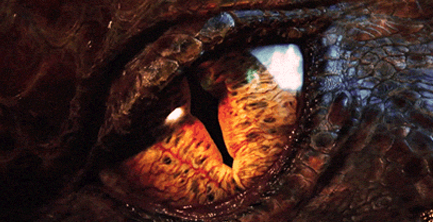All There, No Back Again

We should've been here a whole movie ago.
That's what I kept thinking, couldn't stop thinking, all the way through The Desolation of Smaug: It was taking entirely too long to get to the dragon. But first it took us too long to get to the giant spiders. These two set pieces, plus the troll scene, are what people remember from the novel, and what they were looking for when they came to see Peter Jackson's version.
Here are some things we weren't looking for: Smaug chasing the dwarves all over the mine, shooting flame every minute or so. After waiting so long to see the dragon, now I was growing impatient for him to leave--except when he did, it was to set up the cliff hanger for the third movie.
Earlier on, the spiders seemed almost an inconvenience, a trick for introducing us to a superfluous scene involving Legolas, the heroic elf who never appeared in the novel at all.
And that's how it was for the entire nearly three hours of this film: waiting and waiting to see a brilliant visualization of what had previously only existed in my imagination. The visuals did not, by the way, disappoint: everything inch of Middle Earth that Peter Jackson films is exactly what it should be. What's not as it should be, sadly, is the plotting, the pacing, the enormity of these films.
One had the sense with The Lord of the Rings, even in the extended director's cut, that large parts of the story had been removed out of the necessity of condensing it down to nine hours (twelve in the director's cut), and it was a good sense to have. So much happens in that story: movements of entire civilizations, each with its own perspective; competing factions of evil; and off to the side, doing their best to stay out of the thick of it, two small people on a quest to bring it all to a better end than can possibly be had if they fail.
The Hobbit, as written by J.R.R. Tolkien, was never meant to be such a thing. The quest is at the center. Everything we experience is through Bilbo's eyes. The fictional memoir he writes upon returning to the Shire is called "There and Back Again." There are many small adventures in the story, and there is a battle at the end, but this is not an epic of trilogiac proportions.
Given the binary nature of Bilbo's memoir, I could see breaking the story into two parts: getting us to the Lonely Mountain ("There") by the end of the first, then confronting the dragon, fighting over the treasure, and returning home ("Back Again") in the second. I really think there's enough in the novel to sustain that much story.
But a trilogy? To blow this story up into such a huge epic, Peter Jackson has added story lines from other parts of the greater mythology of Middle Earth. He's also ret-conned The Lord of the Rings into a story that did not know it was a prelude to a greater tale, having Gandalf run off to consult with others about the dark forces beginning to stir, and even confront Sauron. Then there are the elves, given far more time than they deserve.
And what of Bilbo, the titular hobbit? In this second chapter, he actually is given very little to say or do. He does perform his rescue from the spiders, and he does cross rhetorical swords with Smaug; but mostly he's just part of the expedition, there to remind us who this movie is supposed to be about, but not given enough to do for us to believe it's his. That is the greatest flaw in this enormous treatment of the book: Bilbo risks becoming a side character. All the dark machinations, the hushed conferences, the debates between elves and wizards and humans over what darkness is brewing on the horizon, is time spent away from Bilbo.
As we watched this movie two nights ago, I found my wrist being pulled over to Amy's eyes so she could check the time. I did it myself. This movie was leaving me impatient, wishing there was less spectacle, more of the story I have loved since seeing the animated version in 1973, and reading the book for the first time in 1980. By the fourth or fifth time Smaug had filled the screen with draconic flame, I was more than ready for him to take wing and attack the village, where I expected him to be felled with a well-aimed arrow through the one chink in his armor. But no, we'll be waiting another year for that to happen.
I understand the temptation to do all this: Peter Jackson's studio has mastered the technology to make Middle Earth, monsters, elves, dwarves, wizards, the whole ball of wax seem as real as any place on our less fantastic planet; and if you've got it, why not use it? The answer is that this is a story about a small person, and grand though it may be, it needs to be much smaller than it is.
For Hobbit's sake, Peter Jackson, show some restraint! Or do you really want all three of these movies to go down as one of the greatest disappointments in cinematic history?


Comments
Post a Comment